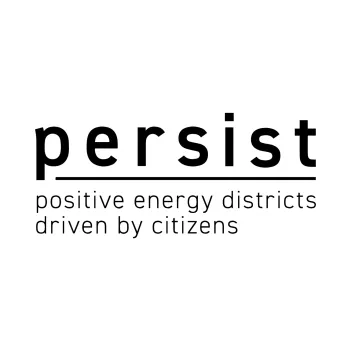PERSIST
Positive EneRgy diStrIctS driven by ciTizens

© persist
- Category
- Project
- Call
- DUT Call 2022
- Duration
- –
- Project coordinator
- Lucerne University of Applied Sciences and Arts
Urban districts must decarbonise while keeping energy systems affordable, resilient, and socially accepted. Positive Energy Districts (PEDs) are a key solution, but their implementation often lacks effective citizen engagement, cross-sector integration, and practical tools for participatory decision-making. The PERSIST project tackles these gaps by combining technical modelling with inclusive, citizen-driven design. Our focus is on bridging the gap between PED concepts and local realities, with a central research question: How can citizen participation and interactive modelling tools, such as Gridly, enhance the design, implementation, and long-term adoption of PEDs?
The complex research objectives of PERSIST forbid a simple ‘one-research-method-fits-all’ approach to yield accurate and replicable results. Therefore, we pursue a mixed-methods technique, i.e., combining qualitative and quantitative research methodologies and across various disciplines.
To find the proposed solutions, PERSIST involves multiple living labs (LLs) and pilots in different countries, increasing the possibilities of multiplication and scaling up of solutions. LLs will be useful to apply a common methodology and a comparative perspective, contrasting partial results to fine-tune them. LLs also enable a collaborative design to incorporate diverse knowledge and contextual realities. In more practical terms, PERSIST will offer solutions to make energy schemes more participative; design energy flexibility as a service solution; propose policy, legal and regulatory recommendations to be implemented at different levels. The geographical diversity in PERSIST (Switzerland, Latvia, Norway, Romania, Spain and Portugal) offers a positive perspective to find scalable solutions.
PERSIST will use the Gridly interactive simulation platform to engage citizens, planners, and stakeholders in co-designing local PED solutions. Gridly allows participants to test scenarios for renewable integration, flexibility options, and energy sharing in real time. This hands-on approach will be combined with socio-economic analysis, policy recommendations, and technical simulations to ensure feasibility and scalability. By integrating PERSIST’s pilots data into Gridly, we create a shared understanding of trade-offs and benefits, enabling informed, community-backed decisions for PED implementation.
PERSIST will deliver a transferable, citizen-centred PED framework tested during project duration and applicable to other European cities. Outcomes include increased renewable energy production and self-consumption, improved flexibility, and stronger local ownership of the energy transition. Anticipated benefits include reduced CO₂ emissions, better integration of distributed energy resources, and enhanced collaboration between citizens, municipalities, and industry. These results will help municipalities build capacity for climate-neutral, socially inclusive urban transformation.
Latvia
Norway
Portugal
Romania
Spain
Switzerland
As Sadales Tikls, Hogskolen I Ostfold, Rigas Tehniska Universitate, Smartcity Alliance, Universidad del Pais Vasco/ Euskal Herriko Unibertsitatea, Universidade de Coimbra, Universitatea Tehnica Cluj-Napoca
Ayuntamiento de Pamplona, Coopernico - Cooperativa de Desenvolvimento Sustentavel Crl, Municipality of Alba Iulia, Rb3 Innovación Urabana Integrada, Stadt Winterthur, Swiitzerland Innovation Park Central, Verdal Kommune, Zala Briviba Biedriba
Contact
Fernando Borges
fernando.borges@ij.uc.pt